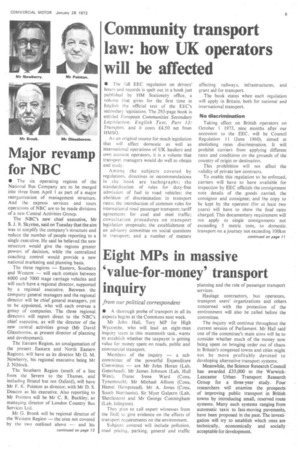Eight MPs in massive 'value-for-money' transport inquiry
Page 11

If you've noticed an error in this article please click here to report it so we can fix it.
from our political correspondent
• A thorough probe of transport in all its aspects begins at the Commons next week.
Mr John Hall, Tory •MP for High Wycombe, who will lead an eight-man inquiry team in this mammoth task, wants to establish whether the taxpayer is getting value for money spent on roads, public and commercial transport.
Members of the inquiry — a subcommittee of the powerful Expenditure Committee — are Mr John Horan (Lab, Gateshead). Mr James Johnson (Lab, Hull West), Dame Irene Ward (Cons, Tynemouth), Mr Michael Allison (Cons, Hemel Hempstead), Mr A. Jones (Cons, South Northants), Sir Myer Galpern (Lab, Shettleston) and Mr George Cunningham (Lab, Islington).
They plan to call expert witnesses from the DoE to give evidence on the effects of transport requirements on the environment.
Subjects covered will include pollution, road pricing, parking, general and traffic
planning and the role of passenger transport services.
Haulage contractors, bus operators, transport users' organizations and others concerned with the protection of the environment will also be called before the corn mittee.
The inquiry will continue throughout the current session of Parliament. Mr Hall said one of the committee's main aims will be to consider whether much of the money now being spent on bringing order out of chaos in Britain's congested towns and cities might not be more profitably devoted to developing alternative transport systems.
Meanwhile, the Science Research Council has awarded £35,000 to the WarwickLancaster Urban Transport Research Group for a three-year study. Four researchers will examine the prospects of improving public transport in British towns by introducing small, reserved route systems. Many such systems ranging from automatic taxis to fast-moving pavements, have been proposed in the past. The investigation will try to establish which ones are technically, economically and socially acceptable for development.
























































































